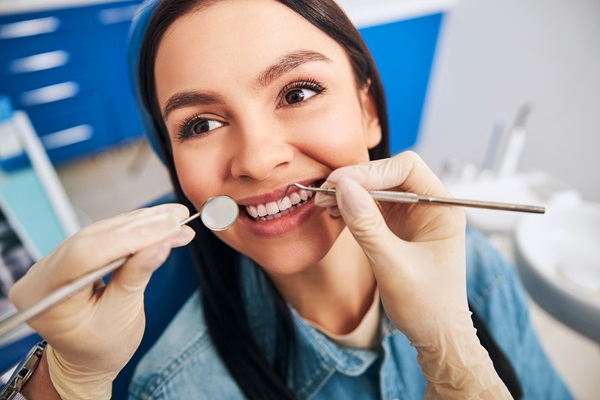General Dentistry Facts: 5 Things You May Not Know About TMJ

TMJ is a condition that affects the temporomandibular joint, which functions as a sliding hinge to connect the skull and the jawbone. When this joint is not working right, the result is discomfort and pain. Left untreated, this condition can lead to headaches, earaches, jaw pain or chronic facial pain. While this is a condition most have heard of, you may not know all you need to know about it.
1. It affects people of all ages
While there is not an exact number available for how many Americans suffer from this condition, the U.S. Department of Health and Human Services National Institutes of Health estimates that the number is over 10 million. People of all ages are affected, although the disease is more prevalent in those over the age of 19. The condition is also more likely to appear in women than in men.
Even children can deal with these problems, although they are less likely. Unfortunately, no age group is safe from the painful and often debilitating effects of the condition. The condition is often self-diagnosable and fortunately can be treated by a professional.
2. There are several causes
If there is trauma to the temporomandibular joint or the jaw, the result may be a disorder. While this is the cause in some cases, others have no direct cause. Because of the likelihood of females to develop TMJ, many professionals are searching for a link with female hormones. Many patients cannot identify the exact time the problem started and, because of that, have a hard time determining the cause.
Some believe that sounds in the jaw joint, such as clicking, will lead to this condition, but researchers have found no direct link. Rather, it is believed that jaw sounds are common. If your jaw makes noises but you do not have limited jaw movement or pain, it is probably perfectly normal.
3. Signs and symptoms are easy to watch for
There are many symptoms related to this condition. Some that you can watch for include:
- Changes in the way the lower and upper teeth fit together
- Painful popping, clicking or grating when the mouth is opened or closed
- Stiffness in the jaw muscle
- Locking of the jaw or limited movement
- Pain in the chewing muscles
4. Treatments have a wide range
Some professionals rely on more conservative treatments such as self-care practices. These may include applying ice packs, eating soft foods and learning stress reduction and relaxing techniques. Others may rely on more extreme measures such as pain medications, stabilization splints or even Botox® to treat the problem.
5. TMJ disorders fall into three categories
Most believe that the disorder falls within three main categories: (1) a dislocated jaw or displaced disc is caused by internal derangement, (2) myofascial pain leads to pain and discomfort in the jaw’s functioning muscles or (3) arthritis affects the joint.
Conclusion
If you are living in pain from this condition and are not sure where to turn, rest assured that there is help available. Diagnosis and treatment can quickly provide relief for many of your symptoms. Discuss your condition with a professional today.
Request an appointment here: https://www.esdmke.com or call Eastside Dental at (414) 888-4000 for an appointment in our Milwaukee office.
Check out what others are saying about our dental services on Yelp: TMJ Dentist.
Recent Posts
Eating, speaking, chewing gum: All these can suddenly become difficult if there is pain in the temporomandibular joint, or TMJ. Jaw pain can be worrisome, but before panicking, it is important to understand that most TMJ disorders improve with at-home care. Pain may resolve in a few days but can sometimes come back in cycles.…
People who have TMJ, Temporomandibular Joint Disorder, may only experience fairly mild symptoms. In some cases, these symptoms improve without assistance from a dentist or other medical professional. Yet a proactive patient who employs self-care practices in a basic home therapy regimen stands a much better chance of obtaining relief. Here is a look at…
When considering full mouth reconstruction to restore oral health, it is important to learn about the process, including the choice to make. When multiple dental issues are present, a full mouth reconstruction is usually the best procedure to correct the problems and restore oral functions and one's appearance. Since there is a lot of information…
A dental bridge can replace a missing tooth or a row of missing teeth. This dental restoration can prevent you from experiencing the complications of tooth loss. Knowing this treatment better can help you prepare for your next visit. Here are some dental bridge benefits that you must consider.Teeth have roots that anchor them to…


